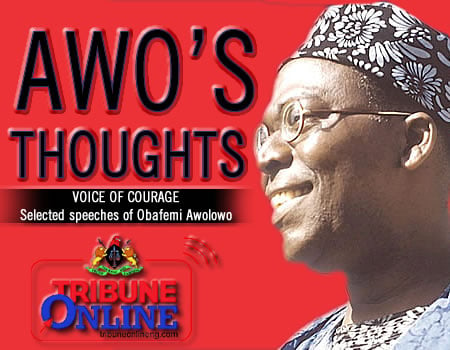CONTINUED FROM LAST WEEK
About 24 centuries later, Hegel introduced what he called ‘The Loftier Dialectic.’ According to him, dialectic is not an activity of the mind applied to some external matter in issue with a view to exposing its contradictions and discovering its truth. Rather the Hegelian dialectic is the unfolding of the very soul of the matter itself, under the never-ceasing and ever-progressive impetus of the Idea. The Idea is complete in itself and absolute. It has in itself and in absolute perfection the qualities of freedom, justice, equality, truth and other forms of social ideas and moralities. But since in the beginning the Idea was unconscious of itself and its virtues, it seeks through the dialectic process to become conscious of itself, and to realise its own inherent qualities and virtues. In the course of its development towards self-realisation, the Idea uses men and matters.
Behind the Idea is God who is the Author of everything in the universe. He employs the Idea as the embodiment of all the good things He plans for the universe. In its turn, the Idea, by means of the dialectic process, manifesting itself through men and matters, progressively realises itself in the real world. In other words, everything that happens in this world happens because the Idea wants it to happen; and all the mean and great actions of men, and the low depravity and the heights of great ideals to which they descend and soar are possible because men have been influenced and inspired by the Idea. In all these, the instrument which the Idea uses is the dialectic. In other words, the dialectic means simply the interaction between the Idea on the one hand, and the events of nature as well as what Hegel terms ‘the complex of human passions’ on the other. It is from this interaction that, to use another of Hegel’s graphic expressions, ‘the vast arras-web of universal history’ is woven. Hegel, therefore, accepts the doctrine of theodicy, that is that God is responsible for all the things that happen in the world – good and evil – and that all such happenings are designed for the vindication of His divine providence. This must be so because, according to Hegel, all the events of nature and of history, of whatever kind so-ever, are moments in the Idea’s dialectic procession to full self-realisation, in which the qualities of truth, freedom, justice, equality, and other forms of social ideals and moralities will be established in their indefeasible absoluteness and perfection. The principles of dialectic, as propounded by Hegel, can therefore be seen as the principles of change and of progress: of progress ‘from lower to higher; from part to whole; from the indeterminate to the determinate’.
Hegel regards each stage reached by the Idea in its dialectic procession to absolute self-realization as a THESIS. But since such a stage falls short of the absolute, that is of perfection, the dialectic, of its own volition, calls into being a movement designed to remove the prevailing imperfection. This counter-movement Hegel calls the ANTITHESIS. With the emergence of the antithesis, a war 01 attrition between the thesis and the antithesis begins. At first the waging of this war is imperceptible; then, it becomes fairly obvious that such a war is in progress; and then, in the end a sudder explosion occurs in which both the thesis and antithesis, in their original forms, disappear, and the SYNTHESIS appears which embodies the best in both, but with the best in the antithesis being the dominant feature of the synthesis. For a while the dialectic process comes to a temporary halt; ‘the antithesis is in abeyance.’ But in the course of time, the dialectic procession resumes its forward march, because perfection is not yet reached. At the commencement of this renewed march, the synthesis becomes the thesis which in turn calls forth its own antithesis, and so on and so forth, until perfection is reached. “It will be seen that every stage in world history and development which is short of perfection contains in it the germ of its own radical and revolutionary reformation. Because of the never-ceasing and ever- progressive impetus of the Idea, each imperfect stage calls forth its own reformer and revolutionary, or what Hegel calls ‘the Hero’, ‘the world-historical individual’, or ‘the man of action’ matched, companion, and supported by appropriate events of nature to make the antithesis effective. In other words, all the events of nature and history are the progressive objectification of God’s plan through the Idea and by means of the dialectic procession which we have described.
Marx, himself, a Hegelian of the left, disagrees with the Hegelian dialectic which makes the Idea the embodiment of truth, freedom, justice, equality, and other forms of social ideals and moralities, and the sole inspirer and motivator of human actions. Says Marx, ‘my dialectic method is not only different from the Hegelian, but is its direct opposite. Hegel thinks that the real world is only the external phenomenal form of the Idea, whereas my own view is that the ideal is nothing else than the material world reflected by the human mind and translated into forms of thought. Nevertheless, with respect to dialectic, Hegel is the first to present its general form of working in a comprehensive and conscious manner. The only trouble is that with Hegel, dialectic is standing on its head. It must be turned right side up again. ‘3 It will be seen from this excerpt that the whilst Marx accepts Hegel’s dialectic cycle of THESlS-ANTITHESIS- SYNTHESIS- THESIS, he rejects the Hegelian propositions that the events of Nature and of history, and the ideals of freedom, justice, religion, etc., which man cherishes are the progressive objectification of the Idea.
CONTINUES NEXT WEEK
YOU SHOULD NOT MISS THESE HEADLINES FROM NIGERIAN TRIBUNE
Battle For First Bank: The Untold Story
Last week was one of twists and turns for First Bank of Nigeria Limited, the nation’s oldest banking institution. It was a week that saw the bank’s MD sacked and reinstated, as major shareholders struggled for control of the financial powerhouse. SULAIMON OLANREWAJU reports…
#EndSARS Panel: Drama As Witness Presents Video Evidence Of Slain Lekki Protesters
A witness of the Lekki tollgate shooting incident, Miss Sarah Ibrahim has presented video evidence of people injured and killed at the scene to the Lagos State Judicial Panel. Tribune Online reports that…
Truck loaded with live bullets falls, spills contents in Onitsha
Onitsha residents are currently in fear, as a truck fully loaded with cartons of live bullets fell into a ditch and spilled its content all around the street, in the commercial city of Anambra State…
After Two Years, Daddy Freeze Apologises To Bishop Oyedepo
Daddy Freeze whose real name is Ifedayo Olarinde has apologised to Bishop Oyedepo who is the presiding bishop and founder of Living Faith Church aka Winners Chapel…
WATCH TOP VIDEOS FROM NIGERIAN TRIBUNE TV
- Let’s Talk About SELF-AWARENESS
- Is Your Confidence Mistaken for Pride? Let’s talk about it
- Is Etiquette About Perfection…Or Just Not Being Rude?
- Top Psychologist Reveal 3 Signs You’re Struggling With Imposter Syndrome
- Do You Pick Up Work-Related Calls at Midnight or Never? Let’s Talk About Boundaries







